Intellectual Property Law and Copyright Infringement Case Study
VerifiedAdded on 2019/09/23
|8
|3198
|96
Case Study
AI Summary
This case study analyzes a scenario involving Anthony Wood, a YouTuber whose video game walkthroughs are being illegally uploaded and distributed by an anonymous group on a US-based website, gamerwalkthroughs.com, with a British website, britgamer.com, linking to the infringing content. The assignment explores the application of intellectual property laws, including the UK Intellectual Property Act 2014, the UK Fraud Act 2006, and the UK Digital Economy Act 2010, in addressing copyright infringement. It discusses the roles of the High Courts and service providers in copyright cases, as well as the types of works protected under UK copyright law. The study also examines international copyright laws, particularly the Berne Convention, and the potential remedies available to Anthony Wood, considering the cross-border nature of the infringement and the involvement of both UK and US jurisdictions. The analysis considers the interplay between economic and moral rights of copyright holders, the criminal aspects of copyright infringement, and the potential punishments for online copyright violations, emphasizing the need for legal action against the infringing parties.
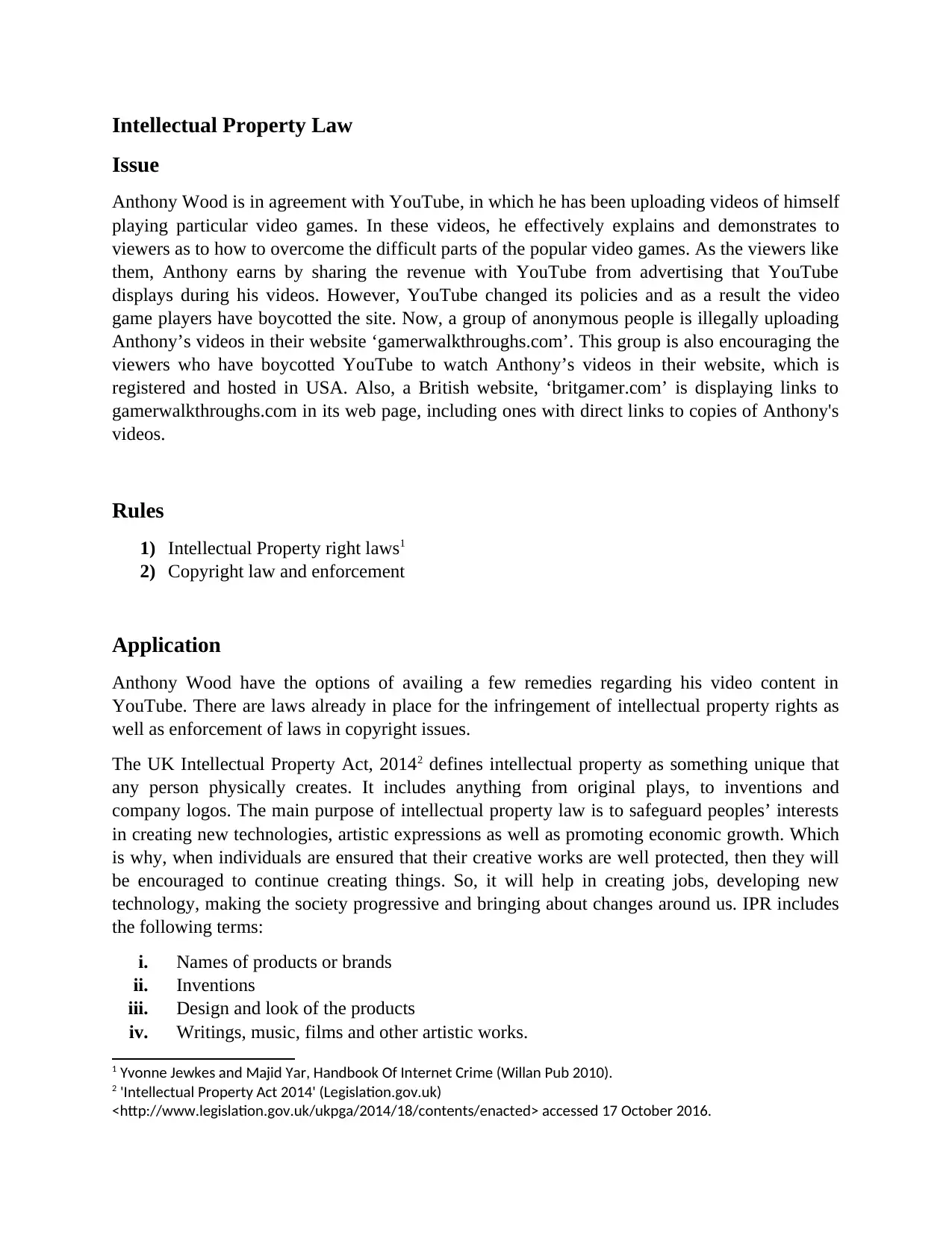
Intellectual Property Law
Issue
Anthony Wood is in agreement with YouTube, in which he has been uploading videos of himself
playing particular video games. In these videos, he effectively explains and demonstrates to
viewers as to how to overcome the difficult parts of the popular video games. As the viewers like
them, Anthony earns by sharing the revenue with YouTube from advertising that YouTube
displays during his videos. However, YouTube changed its policies and as a result the video
game players have boycotted the site. Now, a group of anonymous people is illegally uploading
Anthony’s videos in their website ‘gamerwalkthroughs.com’. This group is also encouraging the
viewers who have boycotted YouTube to watch Anthony’s videos in their website, which is
registered and hosted in USA. Also, a British website, ‘britgamer.com’ is displaying links to
gamerwalkthroughs.com in its web page, including ones with direct links to copies of Anthony's
videos.
Rules
1) Intellectual Property right laws1
2) Copyright law and enforcement
Application
Anthony Wood have the options of availing a few remedies regarding his video content in
YouTube. There are laws already in place for the infringement of intellectual property rights as
well as enforcement of laws in copyright issues.
The UK Intellectual Property Act, 20142 defines intellectual property as something unique that
any person physically creates. It includes anything from original plays, to inventions and
company logos. The main purpose of intellectual property law is to safeguard peoples’ interests
in creating new technologies, artistic expressions as well as promoting economic growth. Which
is why, when individuals are ensured that their creative works are well protected, then they will
be encouraged to continue creating things. So, it will help in creating jobs, developing new
technology, making the society progressive and bringing about changes around us. IPR includes
the following terms:
i. Names of products or brands
ii. Inventions
iii. Design and look of the products
iv. Writings, music, films and other artistic works.
1 Yvonne Jewkes and Majid Yar, Handbook Of Internet Crime (Willan Pub 2010).
2 'Intellectual Property Act 2014' (Legislation.gov.uk)
<http://www.legislation.gov.uk/ukpga/2014/18/contents/enacted> accessed 17 October 2016.
Issue
Anthony Wood is in agreement with YouTube, in which he has been uploading videos of himself
playing particular video games. In these videos, he effectively explains and demonstrates to
viewers as to how to overcome the difficult parts of the popular video games. As the viewers like
them, Anthony earns by sharing the revenue with YouTube from advertising that YouTube
displays during his videos. However, YouTube changed its policies and as a result the video
game players have boycotted the site. Now, a group of anonymous people is illegally uploading
Anthony’s videos in their website ‘gamerwalkthroughs.com’. This group is also encouraging the
viewers who have boycotted YouTube to watch Anthony’s videos in their website, which is
registered and hosted in USA. Also, a British website, ‘britgamer.com’ is displaying links to
gamerwalkthroughs.com in its web page, including ones with direct links to copies of Anthony's
videos.
Rules
1) Intellectual Property right laws1
2) Copyright law and enforcement
Application
Anthony Wood have the options of availing a few remedies regarding his video content in
YouTube. There are laws already in place for the infringement of intellectual property rights as
well as enforcement of laws in copyright issues.
The UK Intellectual Property Act, 20142 defines intellectual property as something unique that
any person physically creates. It includes anything from original plays, to inventions and
company logos. The main purpose of intellectual property law is to safeguard peoples’ interests
in creating new technologies, artistic expressions as well as promoting economic growth. Which
is why, when individuals are ensured that their creative works are well protected, then they will
be encouraged to continue creating things. So, it will help in creating jobs, developing new
technology, making the society progressive and bringing about changes around us. IPR includes
the following terms:
i. Names of products or brands
ii. Inventions
iii. Design and look of the products
iv. Writings, music, films and other artistic works.
1 Yvonne Jewkes and Majid Yar, Handbook Of Internet Crime (Willan Pub 2010).
2 'Intellectual Property Act 2014' (Legislation.gov.uk)
<http://www.legislation.gov.uk/ukpga/2014/18/contents/enacted> accessed 17 October 2016.
Paraphrase This Document
Need a fresh take? Get an instant paraphrase of this document with our AI Paraphraser
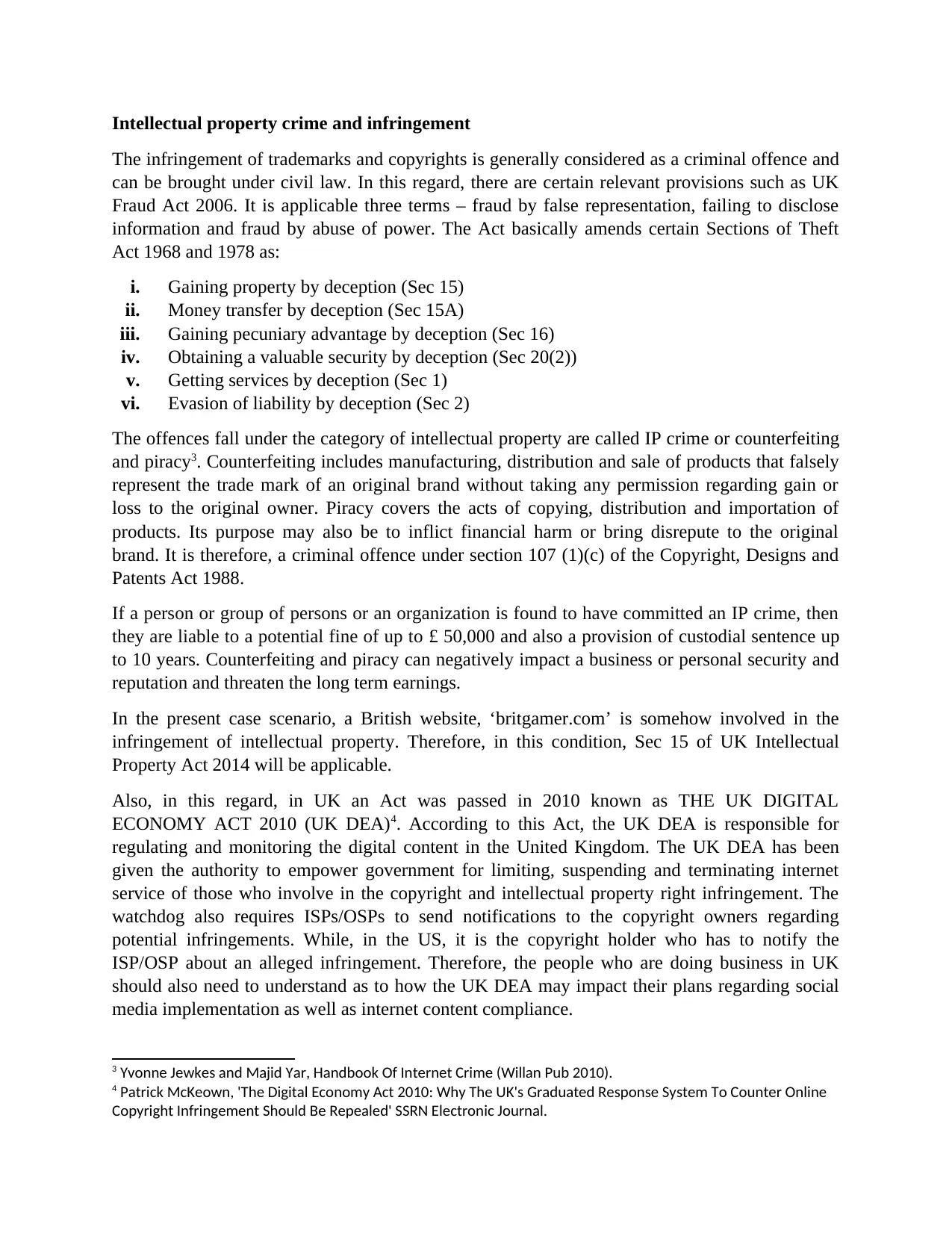
Intellectual property crime and infringement
The infringement of trademarks and copyrights is generally considered as a criminal offence and
can be brought under civil law. In this regard, there are certain relevant provisions such as UK
Fraud Act 2006. It is applicable three terms – fraud by false representation, failing to disclose
information and fraud by abuse of power. The Act basically amends certain Sections of Theft
Act 1968 and 1978 as:
i. Gaining property by deception (Sec 15)
ii. Money transfer by deception (Sec 15A)
iii. Gaining pecuniary advantage by deception (Sec 16)
iv. Obtaining a valuable security by deception (Sec 20(2))
v. Getting services by deception (Sec 1)
vi. Evasion of liability by deception (Sec 2)
The offences fall under the category of intellectual property are called IP crime or counterfeiting
and piracy3. Counterfeiting includes manufacturing, distribution and sale of products that falsely
represent the trade mark of an original brand without taking any permission regarding gain or
loss to the original owner. Piracy covers the acts of copying, distribution and importation of
products. Its purpose may also be to inflict financial harm or bring disrepute to the original
brand. It is therefore, a criminal offence under section 107 (1)(c) of the Copyright, Designs and
Patents Act 1988.
If a person or group of persons or an organization is found to have committed an IP crime, then
they are liable to a potential fine of up to £ 50,000 and also a provision of custodial sentence up
to 10 years. Counterfeiting and piracy can negatively impact a business or personal security and
reputation and threaten the long term earnings.
In the present case scenario, a British website, ‘britgamer.com’ is somehow involved in the
infringement of intellectual property. Therefore, in this condition, Sec 15 of UK Intellectual
Property Act 2014 will be applicable.
Also, in this regard, in UK an Act was passed in 2010 known as THE UK DIGITAL
ECONOMY ACT 2010 (UK DEA)4. According to this Act, the UK DEA is responsible for
regulating and monitoring the digital content in the United Kingdom. The UK DEA has been
given the authority to empower government for limiting, suspending and terminating internet
service of those who involve in the copyright and intellectual property right infringement. The
watchdog also requires ISPs/OSPs to send notifications to the copyright owners regarding
potential infringements. While, in the US, it is the copyright holder who has to notify the
ISP/OSP about an alleged infringement. Therefore, the people who are doing business in UK
should also need to understand as to how the UK DEA may impact their plans regarding social
media implementation as well as internet content compliance.
3 Yvonne Jewkes and Majid Yar, Handbook Of Internet Crime (Willan Pub 2010).
4 Patrick McKeown, 'The Digital Economy Act 2010: Why The UK's Graduated Response System To Counter Online
Copyright Infringement Should Be Repealed' SSRN Electronic Journal.
The infringement of trademarks and copyrights is generally considered as a criminal offence and
can be brought under civil law. In this regard, there are certain relevant provisions such as UK
Fraud Act 2006. It is applicable three terms – fraud by false representation, failing to disclose
information and fraud by abuse of power. The Act basically amends certain Sections of Theft
Act 1968 and 1978 as:
i. Gaining property by deception (Sec 15)
ii. Money transfer by deception (Sec 15A)
iii. Gaining pecuniary advantage by deception (Sec 16)
iv. Obtaining a valuable security by deception (Sec 20(2))
v. Getting services by deception (Sec 1)
vi. Evasion of liability by deception (Sec 2)
The offences fall under the category of intellectual property are called IP crime or counterfeiting
and piracy3. Counterfeiting includes manufacturing, distribution and sale of products that falsely
represent the trade mark of an original brand without taking any permission regarding gain or
loss to the original owner. Piracy covers the acts of copying, distribution and importation of
products. Its purpose may also be to inflict financial harm or bring disrepute to the original
brand. It is therefore, a criminal offence under section 107 (1)(c) of the Copyright, Designs and
Patents Act 1988.
If a person or group of persons or an organization is found to have committed an IP crime, then
they are liable to a potential fine of up to £ 50,000 and also a provision of custodial sentence up
to 10 years. Counterfeiting and piracy can negatively impact a business or personal security and
reputation and threaten the long term earnings.
In the present case scenario, a British website, ‘britgamer.com’ is somehow involved in the
infringement of intellectual property. Therefore, in this condition, Sec 15 of UK Intellectual
Property Act 2014 will be applicable.
Also, in this regard, in UK an Act was passed in 2010 known as THE UK DIGITAL
ECONOMY ACT 2010 (UK DEA)4. According to this Act, the UK DEA is responsible for
regulating and monitoring the digital content in the United Kingdom. The UK DEA has been
given the authority to empower government for limiting, suspending and terminating internet
service of those who involve in the copyright and intellectual property right infringement. The
watchdog also requires ISPs/OSPs to send notifications to the copyright owners regarding
potential infringements. While, in the US, it is the copyright holder who has to notify the
ISP/OSP about an alleged infringement. Therefore, the people who are doing business in UK
should also need to understand as to how the UK DEA may impact their plans regarding social
media implementation as well as internet content compliance.
3 Yvonne Jewkes and Majid Yar, Handbook Of Internet Crime (Willan Pub 2010).
4 Patrick McKeown, 'The Digital Economy Act 2010: Why The UK's Graduated Response System To Counter Online
Copyright Infringement Should Be Repealed' SSRN Electronic Journal.
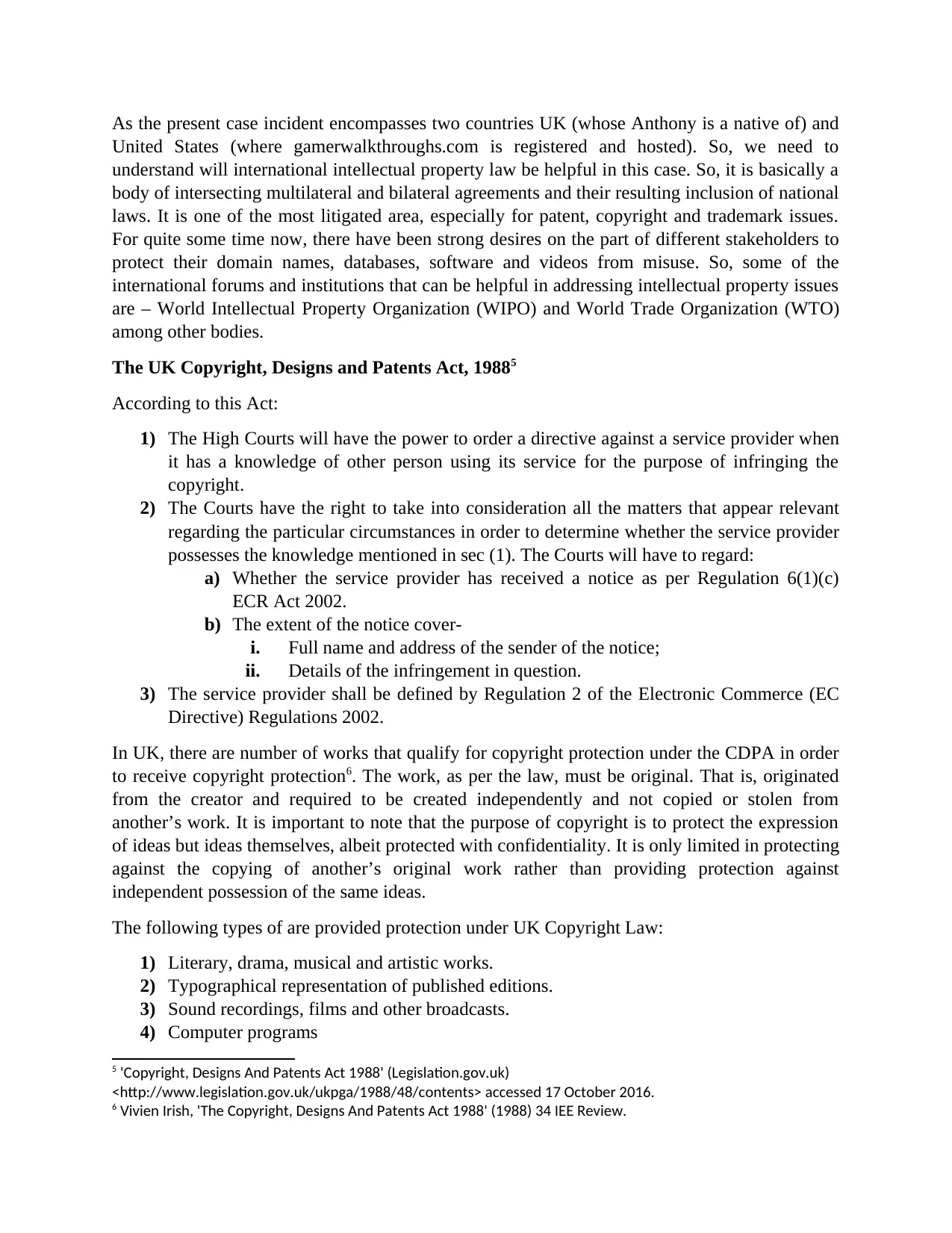
As the present case incident encompasses two countries UK (whose Anthony is a native of) and
United States (where gamerwalkthroughs.com is registered and hosted). So, we need to
understand will international intellectual property law be helpful in this case. So, it is basically a
body of intersecting multilateral and bilateral agreements and their resulting inclusion of national
laws. It is one of the most litigated area, especially for patent, copyright and trademark issues.
For quite some time now, there have been strong desires on the part of different stakeholders to
protect their domain names, databases, software and videos from misuse. So, some of the
international forums and institutions that can be helpful in addressing intellectual property issues
are – World Intellectual Property Organization (WIPO) and World Trade Organization (WTO)
among other bodies.
The UK Copyright, Designs and Patents Act, 19885
According to this Act:
1) The High Courts will have the power to order a directive against a service provider when
it has a knowledge of other person using its service for the purpose of infringing the
copyright.
2) The Courts have the right to take into consideration all the matters that appear relevant
regarding the particular circumstances in order to determine whether the service provider
possesses the knowledge mentioned in sec (1). The Courts will have to regard:
a) Whether the service provider has received a notice as per Regulation 6(1)(c)
ECR Act 2002.
b) The extent of the notice cover-
i. Full name and address of the sender of the notice;
ii. Details of the infringement in question.
3) The service provider shall be defined by Regulation 2 of the Electronic Commerce (EC
Directive) Regulations 2002.
In UK, there are number of works that qualify for copyright protection under the CDPA in order
to receive copyright protection6. The work, as per the law, must be original. That is, originated
from the creator and required to be created independently and not copied or stolen from
another’s work. It is important to note that the purpose of copyright is to protect the expression
of ideas but ideas themselves, albeit protected with confidentiality. It is only limited in protecting
against the copying of another’s original work rather than providing protection against
independent possession of the same ideas.
The following types of are provided protection under UK Copyright Law:
1) Literary, drama, musical and artistic works.
2) Typographical representation of published editions.
3) Sound recordings, films and other broadcasts.
4) Computer programs
5 'Copyright, Designs And Patents Act 1988' (Legislation.gov.uk)
<http://www.legislation.gov.uk/ukpga/1988/48/contents> accessed 17 October 2016.
6 Vivien Irish, 'The Copyright, Designs And Patents Act 1988' (1988) 34 IEE Review.
United States (where gamerwalkthroughs.com is registered and hosted). So, we need to
understand will international intellectual property law be helpful in this case. So, it is basically a
body of intersecting multilateral and bilateral agreements and their resulting inclusion of national
laws. It is one of the most litigated area, especially for patent, copyright and trademark issues.
For quite some time now, there have been strong desires on the part of different stakeholders to
protect their domain names, databases, software and videos from misuse. So, some of the
international forums and institutions that can be helpful in addressing intellectual property issues
are – World Intellectual Property Organization (WIPO) and World Trade Organization (WTO)
among other bodies.
The UK Copyright, Designs and Patents Act, 19885
According to this Act:
1) The High Courts will have the power to order a directive against a service provider when
it has a knowledge of other person using its service for the purpose of infringing the
copyright.
2) The Courts have the right to take into consideration all the matters that appear relevant
regarding the particular circumstances in order to determine whether the service provider
possesses the knowledge mentioned in sec (1). The Courts will have to regard:
a) Whether the service provider has received a notice as per Regulation 6(1)(c)
ECR Act 2002.
b) The extent of the notice cover-
i. Full name and address of the sender of the notice;
ii. Details of the infringement in question.
3) The service provider shall be defined by Regulation 2 of the Electronic Commerce (EC
Directive) Regulations 2002.
In UK, there are number of works that qualify for copyright protection under the CDPA in order
to receive copyright protection6. The work, as per the law, must be original. That is, originated
from the creator and required to be created independently and not copied or stolen from
another’s work. It is important to note that the purpose of copyright is to protect the expression
of ideas but ideas themselves, albeit protected with confidentiality. It is only limited in protecting
against the copying of another’s original work rather than providing protection against
independent possession of the same ideas.
The following types of are provided protection under UK Copyright Law:
1) Literary, drama, musical and artistic works.
2) Typographical representation of published editions.
3) Sound recordings, films and other broadcasts.
4) Computer programs
5 'Copyright, Designs And Patents Act 1988' (Legislation.gov.uk)
<http://www.legislation.gov.uk/ukpga/1988/48/contents> accessed 17 October 2016.
6 Vivien Irish, 'The Copyright, Designs And Patents Act 1988' (1988) 34 IEE Review.
⊘ This is a preview!⊘
Do you want full access?
Subscribe today to unlock all pages.

Trusted by 1+ million students worldwide
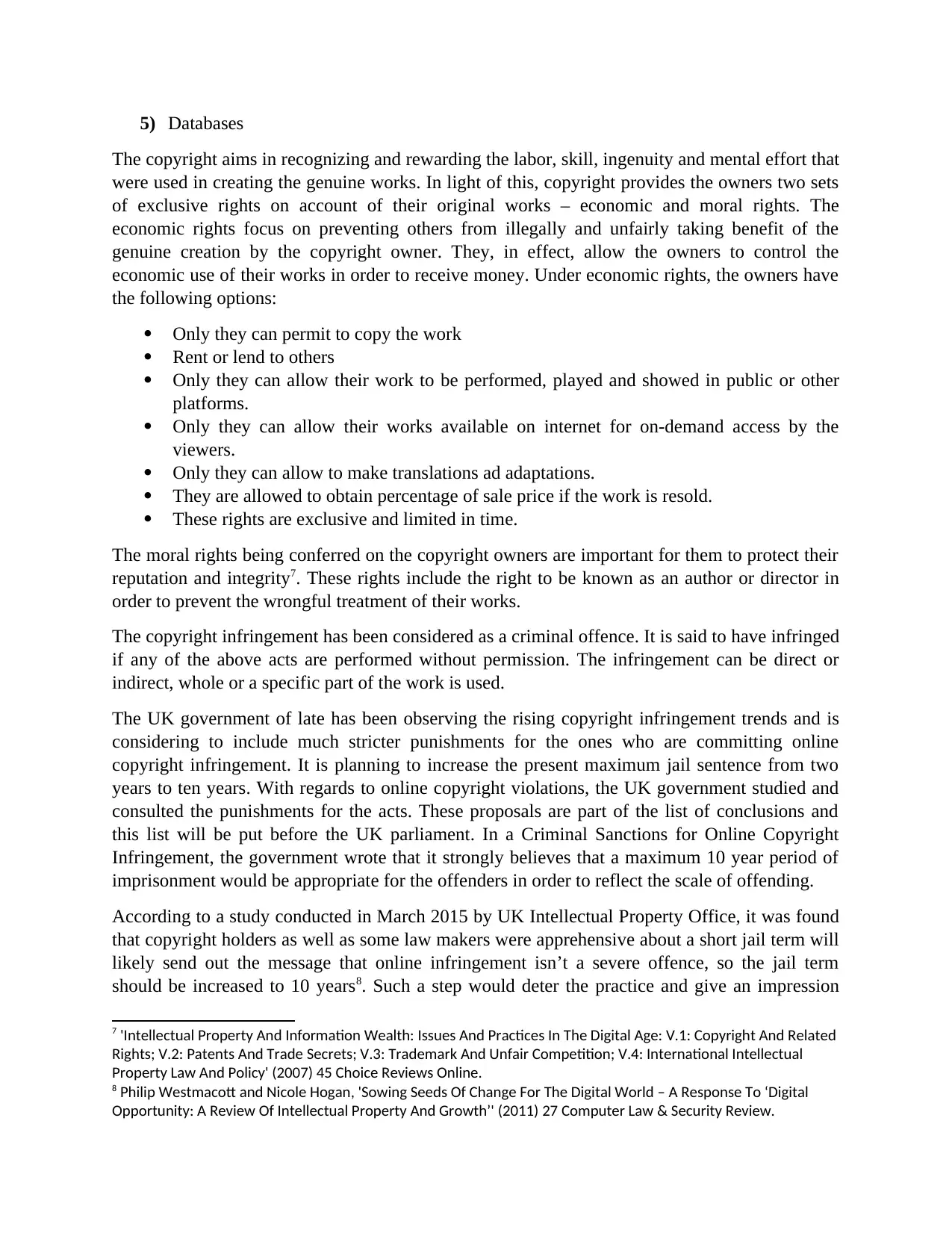
5) Databases
The copyright aims in recognizing and rewarding the labor, skill, ingenuity and mental effort that
were used in creating the genuine works. In light of this, copyright provides the owners two sets
of exclusive rights on account of their original works – economic and moral rights. The
economic rights focus on preventing others from illegally and unfairly taking benefit of the
genuine creation by the copyright owner. They, in effect, allow the owners to control the
economic use of their works in order to receive money. Under economic rights, the owners have
the following options:
Only they can permit to copy the work
Rent or lend to others
Only they can allow their work to be performed, played and showed in public or other
platforms.
Only they can allow their works available on internet for on-demand access by the
viewers.
Only they can allow to make translations ad adaptations.
They are allowed to obtain percentage of sale price if the work is resold.
These rights are exclusive and limited in time.
The moral rights being conferred on the copyright owners are important for them to protect their
reputation and integrity7. These rights include the right to be known as an author or director in
order to prevent the wrongful treatment of their works.
The copyright infringement has been considered as a criminal offence. It is said to have infringed
if any of the above acts are performed without permission. The infringement can be direct or
indirect, whole or a specific part of the work is used.
The UK government of late has been observing the rising copyright infringement trends and is
considering to include much stricter punishments for the ones who are committing online
copyright infringement. It is planning to increase the present maximum jail sentence from two
years to ten years. With regards to online copyright violations, the UK government studied and
consulted the punishments for the acts. These proposals are part of the list of conclusions and
this list will be put before the UK parliament. In a Criminal Sanctions for Online Copyright
Infringement, the government wrote that it strongly believes that a maximum 10 year period of
imprisonment would be appropriate for the offenders in order to reflect the scale of offending.
According to a study conducted in March 2015 by UK Intellectual Property Office, it was found
that copyright holders as well as some law makers were apprehensive about a short jail term will
likely send out the message that online infringement isn’t a severe offence, so the jail term
should be increased to 10 years8. Such a step would deter the practice and give an impression
7 'Intellectual Property And Information Wealth: Issues And Practices In The Digital Age: V.1: Copyright And Related
Rights; V.2: Patents And Trade Secrets; V.3: Trademark And Unfair Competition; V.4: International Intellectual
Property Law And Policy' (2007) 45 Choice Reviews Online.
8 Philip Westmacott and Nicole Hogan, 'Sowing Seeds Of Change For The Digital World – A Response To ‘Digital
Opportunity: A Review Of Intellectual Property And Growth’' (2011) 27 Computer Law & Security Review.
The copyright aims in recognizing and rewarding the labor, skill, ingenuity and mental effort that
were used in creating the genuine works. In light of this, copyright provides the owners two sets
of exclusive rights on account of their original works – economic and moral rights. The
economic rights focus on preventing others from illegally and unfairly taking benefit of the
genuine creation by the copyright owner. They, in effect, allow the owners to control the
economic use of their works in order to receive money. Under economic rights, the owners have
the following options:
Only they can permit to copy the work
Rent or lend to others
Only they can allow their work to be performed, played and showed in public or other
platforms.
Only they can allow their works available on internet for on-demand access by the
viewers.
Only they can allow to make translations ad adaptations.
They are allowed to obtain percentage of sale price if the work is resold.
These rights are exclusive and limited in time.
The moral rights being conferred on the copyright owners are important for them to protect their
reputation and integrity7. These rights include the right to be known as an author or director in
order to prevent the wrongful treatment of their works.
The copyright infringement has been considered as a criminal offence. It is said to have infringed
if any of the above acts are performed without permission. The infringement can be direct or
indirect, whole or a specific part of the work is used.
The UK government of late has been observing the rising copyright infringement trends and is
considering to include much stricter punishments for the ones who are committing online
copyright infringement. It is planning to increase the present maximum jail sentence from two
years to ten years. With regards to online copyright violations, the UK government studied and
consulted the punishments for the acts. These proposals are part of the list of conclusions and
this list will be put before the UK parliament. In a Criminal Sanctions for Online Copyright
Infringement, the government wrote that it strongly believes that a maximum 10 year period of
imprisonment would be appropriate for the offenders in order to reflect the scale of offending.
According to a study conducted in March 2015 by UK Intellectual Property Office, it was found
that copyright holders as well as some law makers were apprehensive about a short jail term will
likely send out the message that online infringement isn’t a severe offence, so the jail term
should be increased to 10 years8. Such a step would deter the practice and give an impression
7 'Intellectual Property And Information Wealth: Issues And Practices In The Digital Age: V.1: Copyright And Related
Rights; V.2: Patents And Trade Secrets; V.3: Trademark And Unfair Competition; V.4: International Intellectual
Property Law And Policy' (2007) 45 Choice Reviews Online.
8 Philip Westmacott and Nicole Hogan, 'Sowing Seeds Of Change For The Digital World – A Response To ‘Digital
Opportunity: A Review Of Intellectual Property And Growth’' (2011) 27 Computer Law & Security Review.
Paraphrase This Document
Need a fresh take? Get an instant paraphrase of this document with our AI Paraphraser
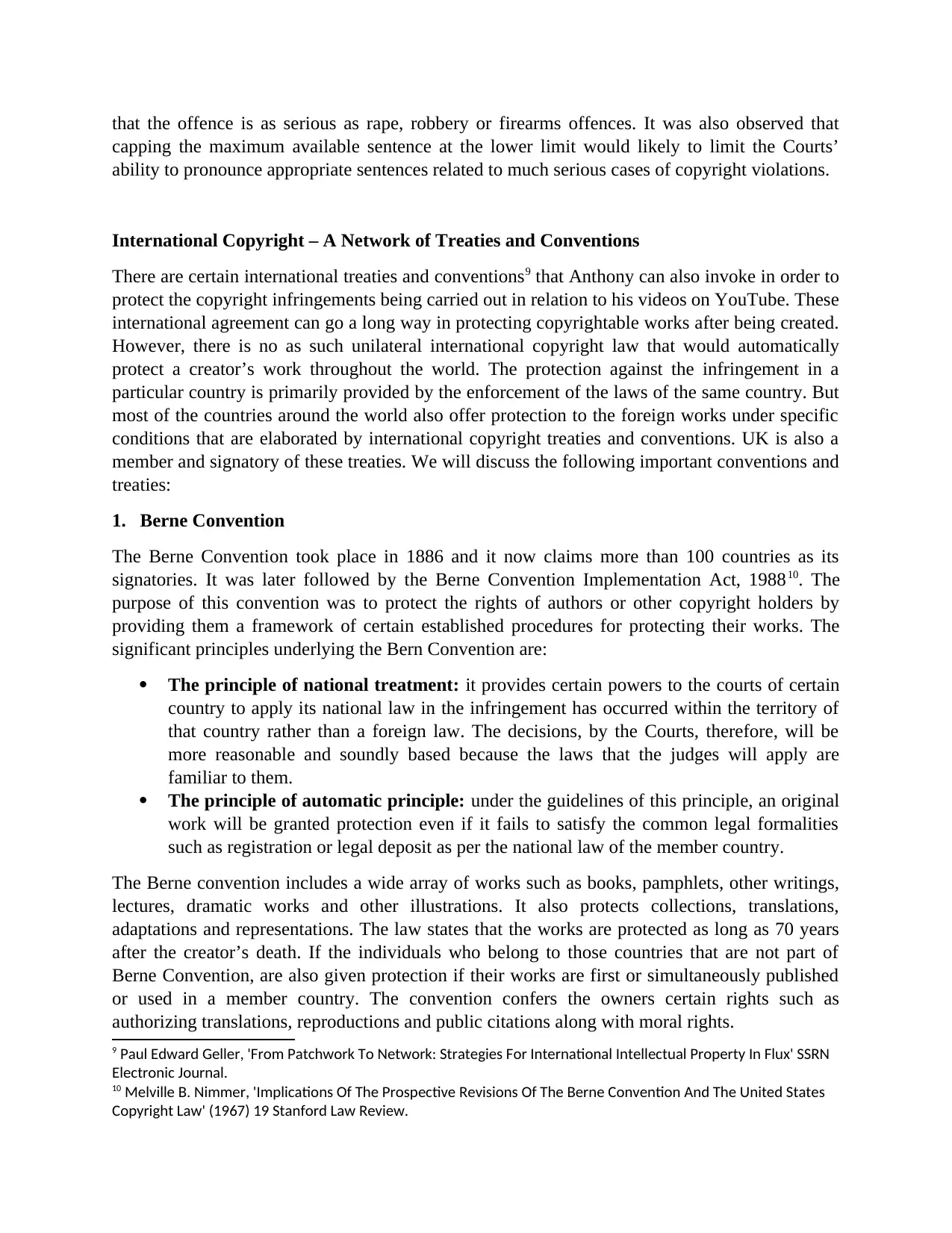
that the offence is as serious as rape, robbery or firearms offences. It was also observed that
capping the maximum available sentence at the lower limit would likely to limit the Courts’
ability to pronounce appropriate sentences related to much serious cases of copyright violations.
International Copyright – A Network of Treaties and Conventions
There are certain international treaties and conventions9 that Anthony can also invoke in order to
protect the copyright infringements being carried out in relation to his videos on YouTube. These
international agreement can go a long way in protecting copyrightable works after being created.
However, there is no as such unilateral international copyright law that would automatically
protect a creator’s work throughout the world. The protection against the infringement in a
particular country is primarily provided by the enforcement of the laws of the same country. But
most of the countries around the world also offer protection to the foreign works under specific
conditions that are elaborated by international copyright treaties and conventions. UK is also a
member and signatory of these treaties. We will discuss the following important conventions and
treaties:
1. Berne Convention
The Berne Convention took place in 1886 and it now claims more than 100 countries as its
signatories. It was later followed by the Berne Convention Implementation Act, 198810. The
purpose of this convention was to protect the rights of authors or other copyright holders by
providing them a framework of certain established procedures for protecting their works. The
significant principles underlying the Bern Convention are:
The principle of national treatment: it provides certain powers to the courts of certain
country to apply its national law in the infringement has occurred within the territory of
that country rather than a foreign law. The decisions, by the Courts, therefore, will be
more reasonable and soundly based because the laws that the judges will apply are
familiar to them.
The principle of automatic principle: under the guidelines of this principle, an original
work will be granted protection even if it fails to satisfy the common legal formalities
such as registration or legal deposit as per the national law of the member country.
The Berne convention includes a wide array of works such as books, pamphlets, other writings,
lectures, dramatic works and other illustrations. It also protects collections, translations,
adaptations and representations. The law states that the works are protected as long as 70 years
after the creator’s death. If the individuals who belong to those countries that are not part of
Berne Convention, are also given protection if their works are first or simultaneously published
or used in a member country. The convention confers the owners certain rights such as
authorizing translations, reproductions and public citations along with moral rights.
9 Paul Edward Geller, 'From Patchwork To Network: Strategies For International Intellectual Property In Flux' SSRN
Electronic Journal.
10 Melville B. Nimmer, 'Implications Of The Prospective Revisions Of The Berne Convention And The United States
Copyright Law' (1967) 19 Stanford Law Review.
capping the maximum available sentence at the lower limit would likely to limit the Courts’
ability to pronounce appropriate sentences related to much serious cases of copyright violations.
International Copyright – A Network of Treaties and Conventions
There are certain international treaties and conventions9 that Anthony can also invoke in order to
protect the copyright infringements being carried out in relation to his videos on YouTube. These
international agreement can go a long way in protecting copyrightable works after being created.
However, there is no as such unilateral international copyright law that would automatically
protect a creator’s work throughout the world. The protection against the infringement in a
particular country is primarily provided by the enforcement of the laws of the same country. But
most of the countries around the world also offer protection to the foreign works under specific
conditions that are elaborated by international copyright treaties and conventions. UK is also a
member and signatory of these treaties. We will discuss the following important conventions and
treaties:
1. Berne Convention
The Berne Convention took place in 1886 and it now claims more than 100 countries as its
signatories. It was later followed by the Berne Convention Implementation Act, 198810. The
purpose of this convention was to protect the rights of authors or other copyright holders by
providing them a framework of certain established procedures for protecting their works. The
significant principles underlying the Bern Convention are:
The principle of national treatment: it provides certain powers to the courts of certain
country to apply its national law in the infringement has occurred within the territory of
that country rather than a foreign law. The decisions, by the Courts, therefore, will be
more reasonable and soundly based because the laws that the judges will apply are
familiar to them.
The principle of automatic principle: under the guidelines of this principle, an original
work will be granted protection even if it fails to satisfy the common legal formalities
such as registration or legal deposit as per the national law of the member country.
The Berne convention includes a wide array of works such as books, pamphlets, other writings,
lectures, dramatic works and other illustrations. It also protects collections, translations,
adaptations and representations. The law states that the works are protected as long as 70 years
after the creator’s death. If the individuals who belong to those countries that are not part of
Berne Convention, are also given protection if their works are first or simultaneously published
or used in a member country. The convention confers the owners certain rights such as
authorizing translations, reproductions and public citations along with moral rights.
9 Paul Edward Geller, 'From Patchwork To Network: Strategies For International Intellectual Property In Flux' SSRN
Electronic Journal.
10 Melville B. Nimmer, 'Implications Of The Prospective Revisions Of The Berne Convention And The United States
Copyright Law' (1967) 19 Stanford Law Review.
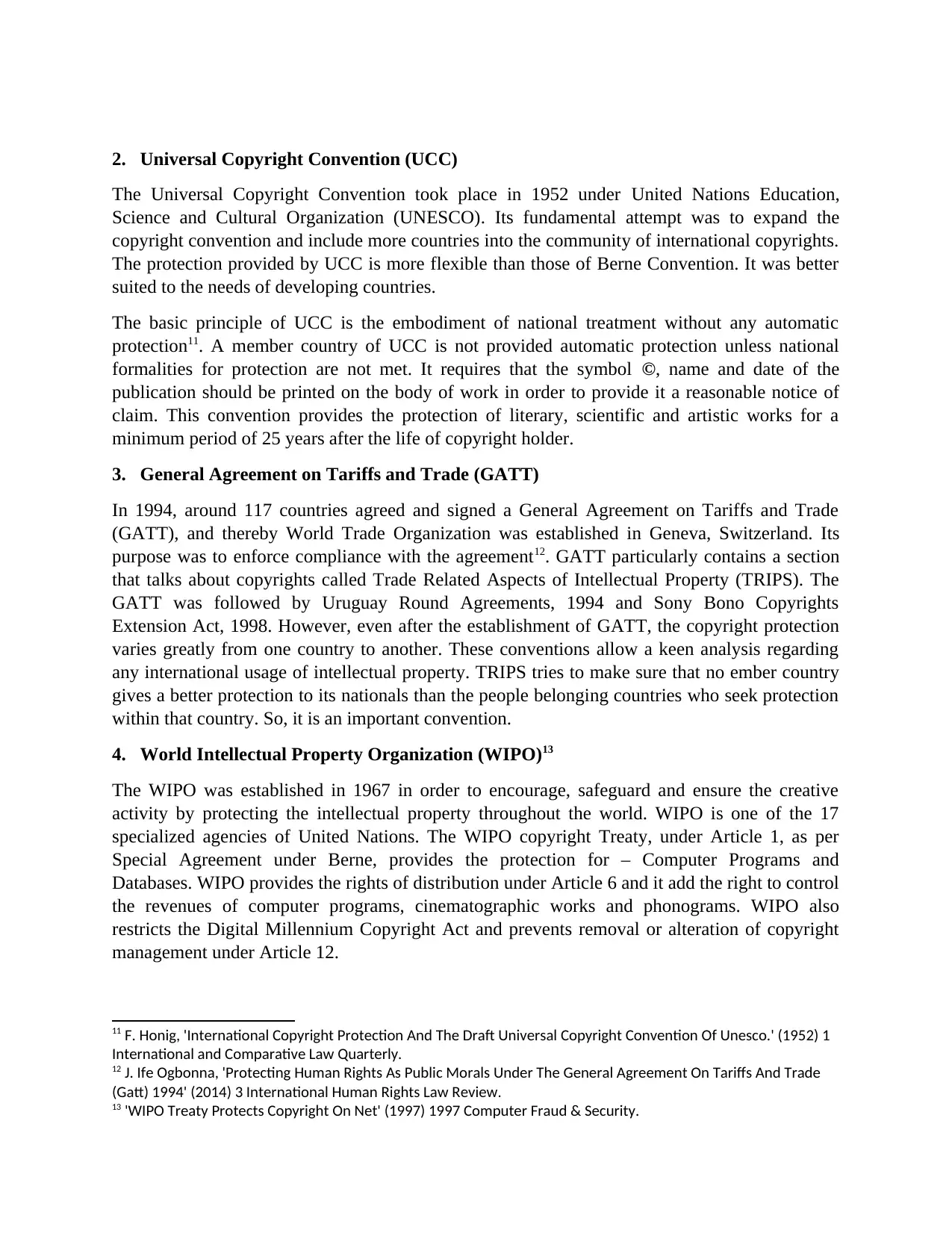
2. Universal Copyright Convention (UCC)
The Universal Copyright Convention took place in 1952 under United Nations Education,
Science and Cultural Organization (UNESCO). Its fundamental attempt was to expand the
copyright convention and include more countries into the community of international copyrights.
The protection provided by UCC is more flexible than those of Berne Convention. It was better
suited to the needs of developing countries.
The basic principle of UCC is the embodiment of national treatment without any automatic
protection11. A member country of UCC is not provided automatic protection unless national
formalities for protection are not met. It requires that the symbol ©, name and date of the
publication should be printed on the body of work in order to provide it a reasonable notice of
claim. This convention provides the protection of literary, scientific and artistic works for a
minimum period of 25 years after the life of copyright holder.
3. General Agreement on Tariffs and Trade (GATT)
In 1994, around 117 countries agreed and signed a General Agreement on Tariffs and Trade
(GATT), and thereby World Trade Organization was established in Geneva, Switzerland. Its
purpose was to enforce compliance with the agreement12. GATT particularly contains a section
that talks about copyrights called Trade Related Aspects of Intellectual Property (TRIPS). The
GATT was followed by Uruguay Round Agreements, 1994 and Sony Bono Copyrights
Extension Act, 1998. However, even after the establishment of GATT, the copyright protection
varies greatly from one country to another. These conventions allow a keen analysis regarding
any international usage of intellectual property. TRIPS tries to make sure that no ember country
gives a better protection to its nationals than the people belonging countries who seek protection
within that country. So, it is an important convention.
4. World Intellectual Property Organization (WIPO)13
The WIPO was established in 1967 in order to encourage, safeguard and ensure the creative
activity by protecting the intellectual property throughout the world. WIPO is one of the 17
specialized agencies of United Nations. The WIPO copyright Treaty, under Article 1, as per
Special Agreement under Berne, provides the protection for – Computer Programs and
Databases. WIPO provides the rights of distribution under Article 6 and it add the right to control
the revenues of computer programs, cinematographic works and phonograms. WIPO also
restricts the Digital Millennium Copyright Act and prevents removal or alteration of copyright
management under Article 12.
11 F. Honig, 'International Copyright Protection And The Draft Universal Copyright Convention Of Unesco.' (1952) 1
International and Comparative Law Quarterly.
12 J. Ife Ogbonna, 'Protecting Human Rights As Public Morals Under The General Agreement On Tariffs And Trade
(Gatt) 1994' (2014) 3 International Human Rights Law Review.
13 'WIPO Treaty Protects Copyright On Net' (1997) 1997 Computer Fraud & Security.
The Universal Copyright Convention took place in 1952 under United Nations Education,
Science and Cultural Organization (UNESCO). Its fundamental attempt was to expand the
copyright convention and include more countries into the community of international copyrights.
The protection provided by UCC is more flexible than those of Berne Convention. It was better
suited to the needs of developing countries.
The basic principle of UCC is the embodiment of national treatment without any automatic
protection11. A member country of UCC is not provided automatic protection unless national
formalities for protection are not met. It requires that the symbol ©, name and date of the
publication should be printed on the body of work in order to provide it a reasonable notice of
claim. This convention provides the protection of literary, scientific and artistic works for a
minimum period of 25 years after the life of copyright holder.
3. General Agreement on Tariffs and Trade (GATT)
In 1994, around 117 countries agreed and signed a General Agreement on Tariffs and Trade
(GATT), and thereby World Trade Organization was established in Geneva, Switzerland. Its
purpose was to enforce compliance with the agreement12. GATT particularly contains a section
that talks about copyrights called Trade Related Aspects of Intellectual Property (TRIPS). The
GATT was followed by Uruguay Round Agreements, 1994 and Sony Bono Copyrights
Extension Act, 1998. However, even after the establishment of GATT, the copyright protection
varies greatly from one country to another. These conventions allow a keen analysis regarding
any international usage of intellectual property. TRIPS tries to make sure that no ember country
gives a better protection to its nationals than the people belonging countries who seek protection
within that country. So, it is an important convention.
4. World Intellectual Property Organization (WIPO)13
The WIPO was established in 1967 in order to encourage, safeguard and ensure the creative
activity by protecting the intellectual property throughout the world. WIPO is one of the 17
specialized agencies of United Nations. The WIPO copyright Treaty, under Article 1, as per
Special Agreement under Berne, provides the protection for – Computer Programs and
Databases. WIPO provides the rights of distribution under Article 6 and it add the right to control
the revenues of computer programs, cinematographic works and phonograms. WIPO also
restricts the Digital Millennium Copyright Act and prevents removal or alteration of copyright
management under Article 12.
11 F. Honig, 'International Copyright Protection And The Draft Universal Copyright Convention Of Unesco.' (1952) 1
International and Comparative Law Quarterly.
12 J. Ife Ogbonna, 'Protecting Human Rights As Public Morals Under The General Agreement On Tariffs And Trade
(Gatt) 1994' (2014) 3 International Human Rights Law Review.
13 'WIPO Treaty Protects Copyright On Net' (1997) 1997 Computer Fraud & Security.
⊘ This is a preview!⊘
Do you want full access?
Subscribe today to unlock all pages.

Trusted by 1+ million students worldwide
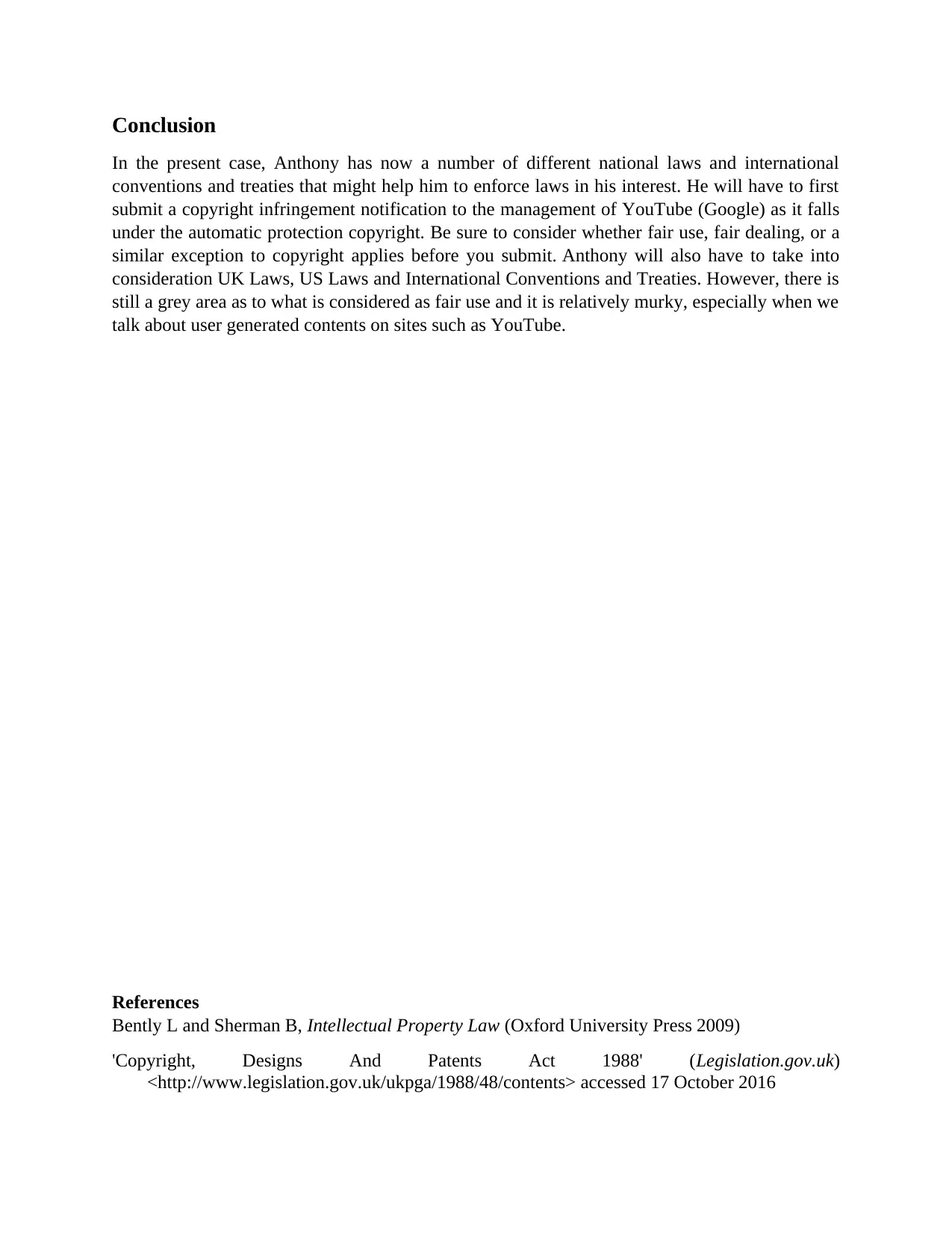
Conclusion
In the present case, Anthony has now a number of different national laws and international
conventions and treaties that might help him to enforce laws in his interest. He will have to first
submit a copyright infringement notification to the management of YouTube (Google) as it falls
under the automatic protection copyright. Be sure to consider whether fair use, fair dealing, or a
similar exception to copyright applies before you submit. Anthony will also have to take into
consideration UK Laws, US Laws and International Conventions and Treaties. However, there is
still a grey area as to what is considered as fair use and it is relatively murky, especially when we
talk about user generated contents on sites such as YouTube.
References
Bently L and Sherman B, Intellectual Property Law (Oxford University Press 2009)
'Copyright, Designs And Patents Act 1988' (Legislation.gov.uk)
<http://www.legislation.gov.uk/ukpga/1988/48/contents> accessed 17 October 2016
In the present case, Anthony has now a number of different national laws and international
conventions and treaties that might help him to enforce laws in his interest. He will have to first
submit a copyright infringement notification to the management of YouTube (Google) as it falls
under the automatic protection copyright. Be sure to consider whether fair use, fair dealing, or a
similar exception to copyright applies before you submit. Anthony will also have to take into
consideration UK Laws, US Laws and International Conventions and Treaties. However, there is
still a grey area as to what is considered as fair use and it is relatively murky, especially when we
talk about user generated contents on sites such as YouTube.
References
Bently L and Sherman B, Intellectual Property Law (Oxford University Press 2009)
'Copyright, Designs And Patents Act 1988' (Legislation.gov.uk)
<http://www.legislation.gov.uk/ukpga/1988/48/contents> accessed 17 October 2016
Paraphrase This Document
Need a fresh take? Get an instant paraphrase of this document with our AI Paraphraser
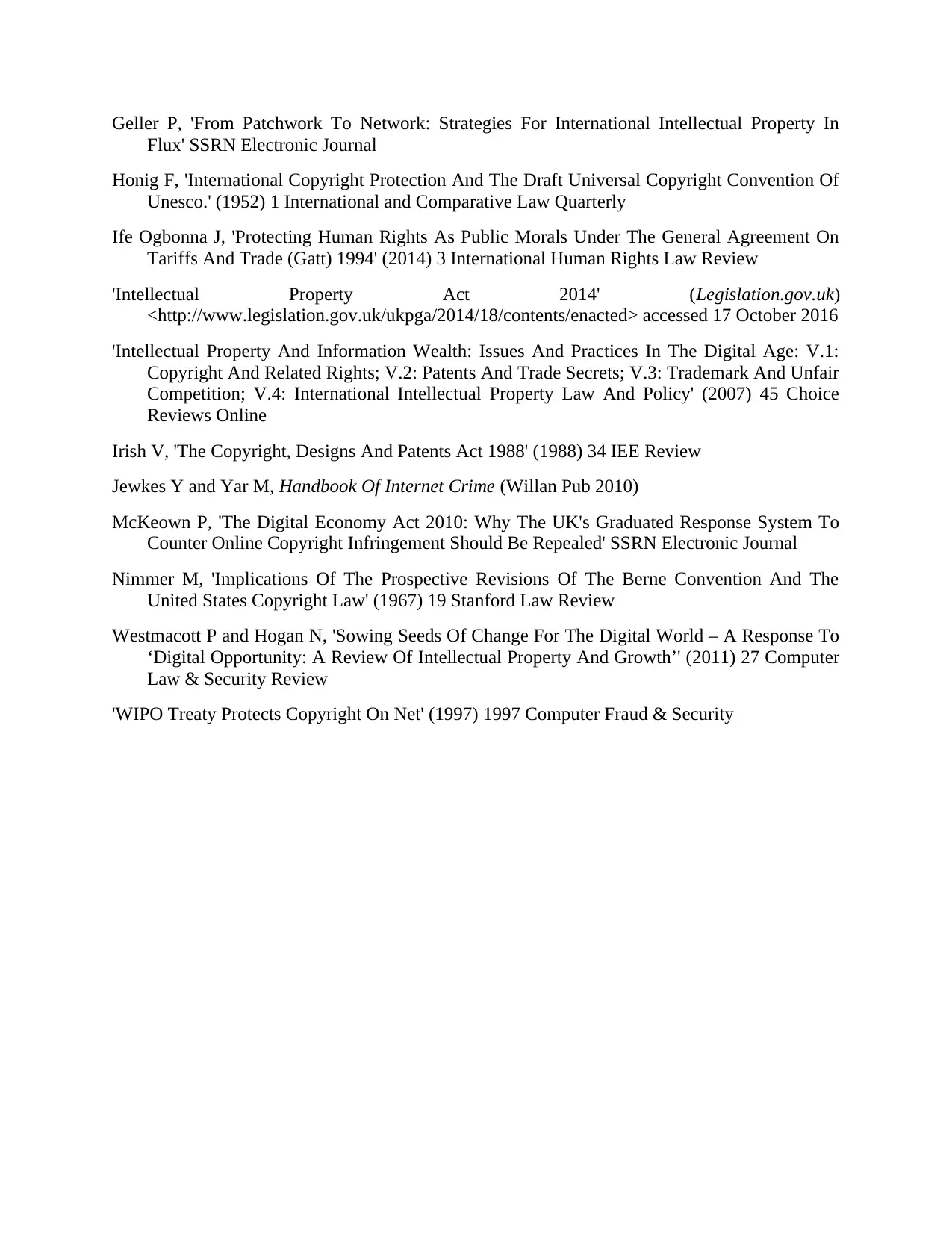
Geller P, 'From Patchwork To Network: Strategies For International Intellectual Property In
Flux' SSRN Electronic Journal
Honig F, 'International Copyright Protection And The Draft Universal Copyright Convention Of
Unesco.' (1952) 1 International and Comparative Law Quarterly
Ife Ogbonna J, 'Protecting Human Rights As Public Morals Under The General Agreement On
Tariffs And Trade (Gatt) 1994' (2014) 3 International Human Rights Law Review
'Intellectual Property Act 2014' (Legislation.gov.uk)
<http://www.legislation.gov.uk/ukpga/2014/18/contents/enacted> accessed 17 October 2016
'Intellectual Property And Information Wealth: Issues And Practices In The Digital Age: V.1:
Copyright And Related Rights; V.2: Patents And Trade Secrets; V.3: Trademark And Unfair
Competition; V.4: International Intellectual Property Law And Policy' (2007) 45 Choice
Reviews Online
Irish V, 'The Copyright, Designs And Patents Act 1988' (1988) 34 IEE Review
Jewkes Y and Yar M, Handbook Of Internet Crime (Willan Pub 2010)
McKeown P, 'The Digital Economy Act 2010: Why The UK's Graduated Response System To
Counter Online Copyright Infringement Should Be Repealed' SSRN Electronic Journal
Nimmer M, 'Implications Of The Prospective Revisions Of The Berne Convention And The
United States Copyright Law' (1967) 19 Stanford Law Review
Westmacott P and Hogan N, 'Sowing Seeds Of Change For The Digital World – A Response To
‘Digital Opportunity: A Review Of Intellectual Property And Growth’' (2011) 27 Computer
Law & Security Review
'WIPO Treaty Protects Copyright On Net' (1997) 1997 Computer Fraud & Security
Flux' SSRN Electronic Journal
Honig F, 'International Copyright Protection And The Draft Universal Copyright Convention Of
Unesco.' (1952) 1 International and Comparative Law Quarterly
Ife Ogbonna J, 'Protecting Human Rights As Public Morals Under The General Agreement On
Tariffs And Trade (Gatt) 1994' (2014) 3 International Human Rights Law Review
'Intellectual Property Act 2014' (Legislation.gov.uk)
<http://www.legislation.gov.uk/ukpga/2014/18/contents/enacted> accessed 17 October 2016
'Intellectual Property And Information Wealth: Issues And Practices In The Digital Age: V.1:
Copyright And Related Rights; V.2: Patents And Trade Secrets; V.3: Trademark And Unfair
Competition; V.4: International Intellectual Property Law And Policy' (2007) 45 Choice
Reviews Online
Irish V, 'The Copyright, Designs And Patents Act 1988' (1988) 34 IEE Review
Jewkes Y and Yar M, Handbook Of Internet Crime (Willan Pub 2010)
McKeown P, 'The Digital Economy Act 2010: Why The UK's Graduated Response System To
Counter Online Copyright Infringement Should Be Repealed' SSRN Electronic Journal
Nimmer M, 'Implications Of The Prospective Revisions Of The Berne Convention And The
United States Copyright Law' (1967) 19 Stanford Law Review
Westmacott P and Hogan N, 'Sowing Seeds Of Change For The Digital World – A Response To
‘Digital Opportunity: A Review Of Intellectual Property And Growth’' (2011) 27 Computer
Law & Security Review
'WIPO Treaty Protects Copyright On Net' (1997) 1997 Computer Fraud & Security
1 out of 8
Your All-in-One AI-Powered Toolkit for Academic Success.
+13062052269
info@desklib.com
Available 24*7 on WhatsApp / Email
![[object Object]](/_next/static/media/star-bottom.7253800d.svg)
Unlock your academic potential
Copyright © 2020–2025 A2Z Services. All Rights Reserved. Developed and managed by ZUCOL.